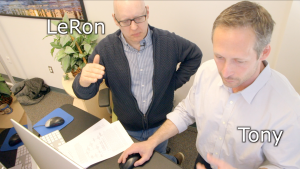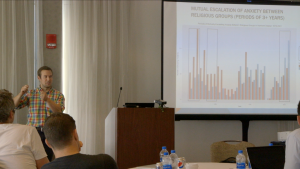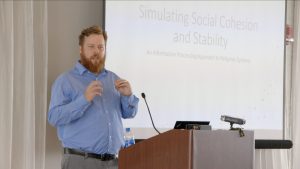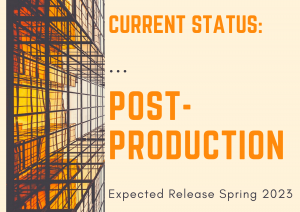 The MRP team meets again in 2018 at the Virginia Modeling, Analysis, & Simulation Center, to field test a new simulation platform that allows non-modelers to build simulations. The programmers built the platform using agent-based models that use artificial intelligence in order to examine social systems and social theories, and developed a web-based simulation development environment. The experts worked to remove as many barriers to modeling for those with no computer programming experience, in order for them to effectively create models.
The MRP team meets again in 2018 at the Virginia Modeling, Analysis, & Simulation Center, to field test a new simulation platform that allows non-modelers to build simulations. The programmers built the platform using agent-based models that use artificial intelligence in order to examine social systems and social theories, and developed a web-based simulation development environment. The experts worked to remove as many barriers to modeling for those with no computer programming experience, in order for them to effectively create models.
 To test their work, they invite a religious studies scholar with no background in computer programming to build a simulation from scratch called the Radicalization and Violent Extremism Model. By using a religion expert to simulate a theory, the MRP team finds that the non-modeler was able to successfully build a complicated model relatively quickly.
To test their work, they invite a religious studies scholar with no background in computer programming to build a simulation from scratch called the Radicalization and Violent Extremism Model. By using a religion expert to simulate a theory, the MRP team finds that the non-modeler was able to successfully build a complicated model relatively quickly.
 The team travels to Boston, MA to host the annual meeting of the International Association for the Cognitive Science of Religion. They present the conclusions of their three-year project and the insights they have gleaned into religious social processes. They share how they wanted to expand and adapt their models and craft a narrative around the information that the simulation is generating.
The team travels to Boston, MA to host the annual meeting of the International Association for the Cognitive Science of Religion. They present the conclusions of their three-year project and the insights they have gleaned into religious social processes. They share how they wanted to expand and adapt their models and craft a narrative around the information that the simulation is generating.
 They followed through on their original promise to deliver models, a non-programmatic simulation platform, and to communicate with the general public about the promise of applying modeling and simulation to the study of religion.
They followed through on their original promise to deliver models, a non-programmatic simulation platform, and to communicate with the general public about the promise of applying modeling and simulation to the study of religion.

